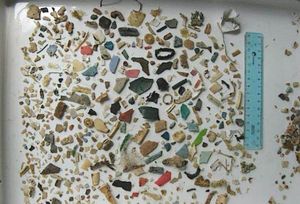Ecco la plastica che è stata trovata nello stomaco di una tartaruga marina pescata in Argentina. Dal Guardian del 24.3.2011:
The plastic found in a single turtle’s stomach
Hundreds of shards reveal the threat to wildlife from debris floating in our seas
By Adam Sherwin
Thursday, 24 March 2011
This collection of hundreds of coloured, jagged shards could be a work of abstract art. But the objects in the photograph to the right are the contents of the stomach of a sea turtle that lost its battle with plastic pollution.
Environmentalists examined the stomach of the juvenile turtle found off the coast of Argentina. The bellyful of debris that they found is symptomatic of the increasing threat to the sea turtles from a human addiction to plastic.
Sea turtles often mistake plastic items for jellyfish or other food. Ingesting non-biodegradable ocean pollution can cause a digestive blockage and internal lacerations. The result can be debilitation, followed by death.
Humans currently produce 260 million tons of plastic a year. When those products are pulled into the sea’s currents, the plastics do not biodegrade but are broken into smaller pieces which are consumed by marine life at the bottom of the food chain. An examination of gastrointestinal obstruction in a green turtle found off Florida discovered that, over the course of a month, the animal’s faeces had contained 74 foreign objects, including “four types of latex balloons, different types of hard plastic, a piece of carpet-like material and two 2-4mm tar balls.”
The biggest rubbish “swill” is the North Pacific Gyre, known as the “great garbage patch”, which is the size of Texas and contains an estimated 3.5 million items of detritus, ranging from toys to toothbrushes.
“The oceans have become one giant refuse bin for all manner of plastics. All sea turtle species are particularly prone and may be seriously harmed,” according to the biologists Colette Wabnitz, from the University of British Columbia, and Wallace Nichols, of the California Academy of Sciences. In “Plastic Pollution: An Ocean Emergency”, they write: “Continued research on the impacts of plastic on the ocean environment and human health is likely to conclude the problem is worse than currently understood.
“The symptom of this growing crisis can be seen inside and on sea turtles as well as their oceanic and terrestrial habitats. Bold initiatives that directly confront the source of plastic pollution, redesign packaging and rethink the very idea of ‘throwaway culture’ are urgently required.”
Almost all marine species, from plankton to whales, have ingested plastic. But, even in small quantities, plastic can kill sea turtles due to obstruction of the oesophagus or perforation of the bowel, the biologists said.
Fifty out of 92 turtles found dead, stranded on the shorelines of Rio Grande do Sul state in Brazil, had ingested a “considerable amount of man-made debris”.
Because young sea turtles indiscriminately feed on pelagic material, “high occurrences of plastic are common in the digestive tract of these small sea turtles,” the biologists write.
They are asking visitors to help reduce the threat from plastics during visits to coastal areas by bringing their own reusable bags and food containers, and avoiding plastic-bottled drinks.


